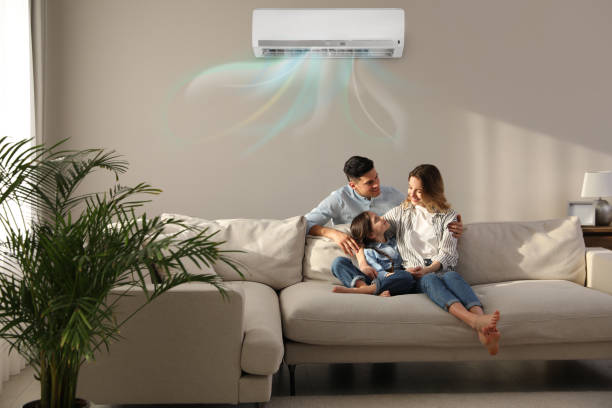On scorching summer days, air conditioning offers more than just luxury; it’s a necessity that significantly impacts health and productivity. This blog post will explore the various benefits of air conditioning, from improving quality of life for homeowners to enhancing tenant satisfaction for property managers and aiding HVAC technicians in understanding customer needs.
The Health and Comfort Benefits of Air Conditioning
Enhanced Air Quality
Air conditioners do more than just regulate temperature. They play a crucial role in filtering out pollutants and allergens from the air. This is particularly important for individuals with respiratory issues or allergies. By reducing the presence of dust, pollen, and other airborne irritants, air conditioning systems help create a healthier living environment.
Comfort in Extreme Weather
Living in regions with extreme weather conditions can be challenging. Air conditioning provides a comfortable indoor environment regardless of the weather outside. During sweltering summers, it prevents heat-related illnesses such as heat stroke and dehydration. In colder climates, advanced systems can also offer heating solutions, ensuring year-round comfort.
Better Sleep Quality
Ever tried sleeping in a hot, stuffy room? It’s nearly impossible. Air conditioning creates an optimal sleeping environment by maintaining a cool and consistent temperature. This not only helps you fall asleep faster but also ensures you stay asleep throughout the night, leading to better overall health and well-being.
Energy Efficiency in Air Conditioning Technology
Advances in Technology
Modern air conditioning systems are more energy-efficient than ever before. Innovations such as inverter technology and smart thermostats allow for precise temperature control, reducing energy consumption. These advancements not only lower utility bills but also minimize the environmental impact of air conditioning.
Eco-friendly Options
With growing awareness about environmental sustainability, many manufacturers are now offering eco-friendly air conditioning solutions. These systems use refrigerants with lower global warming potential (GWP) and are designed to be more energy-efficient. By choosing eco-friendly options, homeowners and property managers can contribute to a greener planet.
Cost Savings
Energy-efficient air conditioning systems might have a higher upfront cost, but the long-term savings are significant. Reduced energy consumption translates to lower utility bills, making these systems a cost-effective choice in the long run. Additionally, many governments offer incentives and rebates for installing energy-efficient appliances, further offsetting initial costs.
How Air Conditioning Can Improve Productivity in Work and Home Spaces
Comfortable Work Environment
Maintaining a comfortable indoor temperature is crucial for productivity. In workplaces, excessive heat or cold can lead to discomfort and distraction, reducing overall efficiency. Air conditioning ensures a steady, comfortable environment, allowing employees to focus better and perform at their best.
Home Office Efficiency
With the rise of remote work, having a comfortable home office has become essential. Air conditioning plays a pivotal role in creating a conducive work environment at home. It helps maintain concentration, reduces fatigue, and minimizes the risk of heat-related discomfort, leading to improved productivity.
Stress Reduction
Extreme temperatures can be stressful and lead to irritability. A well-regulated indoor climate reduces stress levels, creating a more pleasant and productive atmosphere. This is particularly important in high-pressure work environments where maintaining calm and focus is crucial.
Tips for Choosing the Right Air Conditioning System for Your Needs
Assess Your Space
The first step in choosing the right air conditioning system is to assess your space. Consider the size of the area you need to cool, the number of rooms, and the layout of your home or office. Larger spaces might require central air conditioning systems, while smaller areas could benefit from portable or window units.
Energy Efficiency Ratings
Look for systems with high energy efficiency ratings. The Seasonal Energy Efficiency Ratio (SEER) rating is a good indicator of a system’s efficiency. Higher SEER ratings mean better energy efficiency and lower operating costs. Investing in an energy-efficient system will pay off in the long run through reduced utility bills.
Professional Consultation
Consulting with an HVAC professional can provide valuable insights into the best system for your needs. Professionals can perform load calculations, recommend suitable systems, and ensure proper installation, including AC window unit installation. This not only guarantees optimal performance but also extends the lifespan of your air conditioning unit.
The Future of Air Conditioning Innovations and Sustainability
Smart Technology Integration
The future of air conditioning lies in smart technology integration. Smart thermostats and interconnected systems allow for remote control and monitoring, ensuring optimal performance and energy efficiency. These technologies provide real-time data, enabling users to make informed decisions about their energy consumption.
Sustainable Refrigerants
The industry is moving towards the use of sustainable refrigerants with lower environmental impact. Traditional refrigerants contribute to global warming and ozone depletion. Newer, eco-friendly refrigerants aim to reduce these negative effects, making air conditioning more sustainable.
Renewable Energy Integration
Integrating air conditioning systems with renewable energy sources such as solar power is a growing trend. Solar-powered air conditioning units harness the sun’s energy, reducing reliance on traditional electricity sources. This not only cuts down on utility costs but also promotes environmental sustainability.
Conclusion
Air conditioning is no longer a luxury; it’s a necessity in modern living. From enhancing health and comfort to improving productivity and promoting sustainability, the benefits are vast and varied. For homeowners, property managers, and HVAC technicians, understanding these benefits is crucial in making informed decisions about air conditioning systems.

